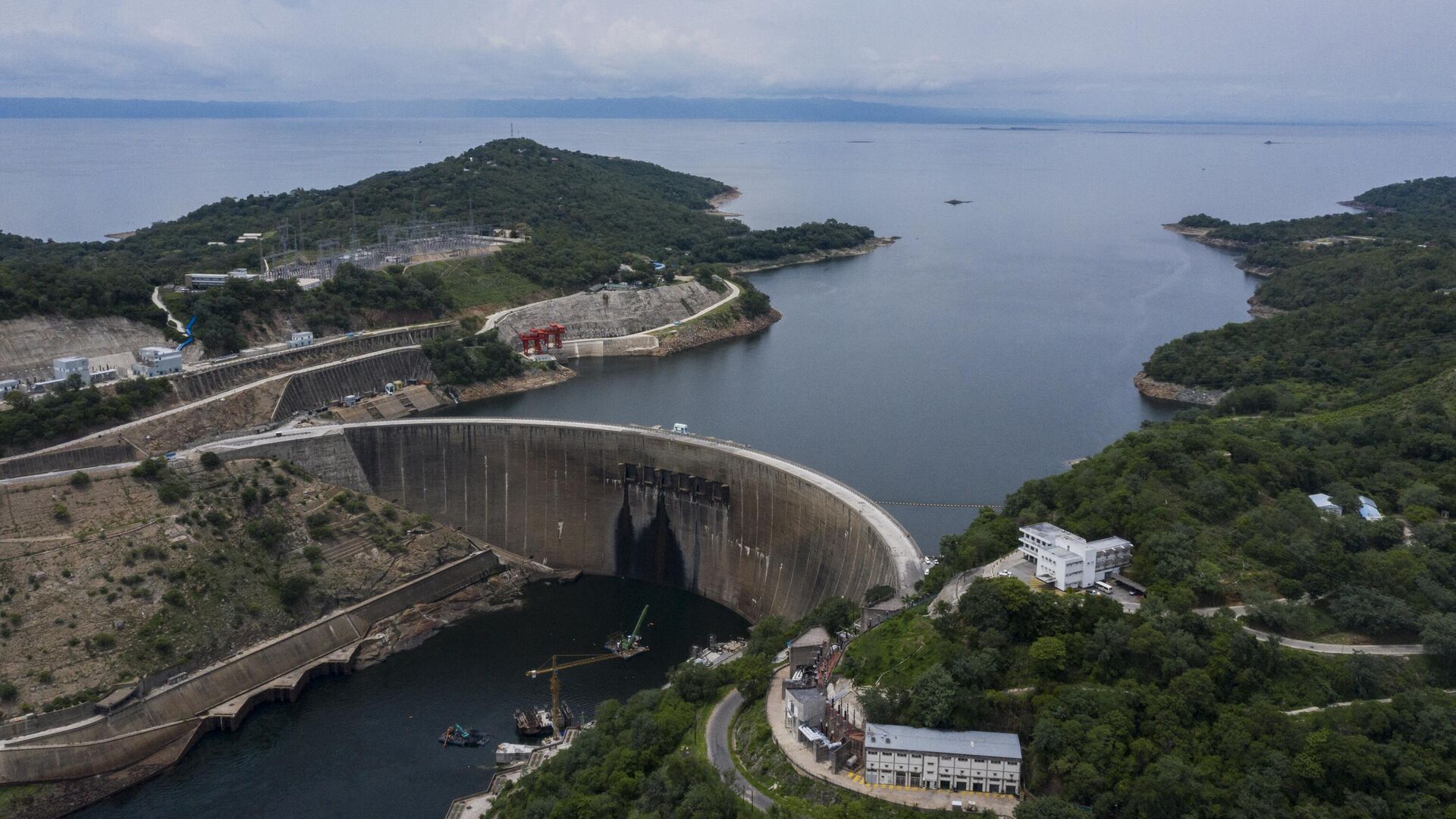https://en.sputniknews.africa/20240615/zimbabwe-looks-to-tajikistans-expertise-to-boost-hydropower-plans-to-engage-neighbors-1067056824.html
Zimbabwe Looks to Tajikistan's Expertise to Boost Hydropower, Plans to Engage Neighbors
Zimbabwe Looks to Tajikistan's Expertise to Boost Hydropower, Plans to Engage Neighbors
Sputnik Africa
From June 10 to 13, world leaders, including a number of African nations, gathered in Tajikistan for the Third Dushanbe Water Action Decade Conference... 15.06.2024, Sputnik Africa
2024-06-15T13:55+0200
2024-06-15T13:55+0200
2024-06-17T10:44+0200
sub-saharan africa
emmerson mnangagwa
zimbabwe
tajikistan
angola
united nations (un)
southern africa development community (sadc)
water security
water resources
power
https://cdn1.img.sputniknews.africa/img/07e8/06/0f/1067056974_0:318:3073:2047_1920x0_80_0_0_395e548bcde841a9bab3fde3fb999ed6.jpg
Zimbabwe is looking to Tajikistan for expertise in maximizing hydropower generation, with Vice President Dr. Constantino Chiwenga announcing plans to engage neighboring countries and explore dam construction on major rivers like the Zambezi and Gairezi.The announcement came after Chiwenga's visit to Tajikistan's Nurek Hydropower Plant, a 3,040 MW project developed in multiple phases. The plant, which towers 300 meters high, dwarfs the Kariba Dam in Zimbabwe, despite having a smaller control center and fewer turbines.Chiwenga visited Tajikistan, which boasts an impressive hydropower generation capacity, to take part in the Third Dushanbe Water Action Decade Conference, co-organized by the UN and Dushanbe. The event focused on accelerating actions towards achieving the Water Action Agenda, a commitment made during the UN 2023 Water Conference.Tajikistan's Minister of Energy and Water Resources, Juma Daler, expressed his country's willingness to partner with Zimbabwe, promising to send a team of experts to identify potential areas for cooperation.Zimbabwe's drive for hydropower expansion stems from its recent success in achieving energy self-sufficiency. President Emmerson Mnangagwa has set a goal of not only becoming energy self-sufficient but also a net exporter, a vision that aligns with the potential offered by the Zambezi River and other water resources.As for other African countries, on the sidelines of the conference, the foreign ministries of Angola and Tajikistan signed a cooperation program.
https://en.sputniknews.africa/20240612/zimbabwe-eyes-increased-cooperation-with-russia-in-education-aiming-for-economic-growth-1067018627.html
zimbabwe
tajikistan
angola
Sputnik Africa
feedback@sputniknews.com
+74956456601
MIA „Rossiya Segodnya“
2024
Muhammad Nooh Osman
https://cdn1.img.sputniknews.africa/img/07e7/04/0a/1058467512_0:0:1280:1280_100x100_80_0_0_ec723833bcbfcaed2e21952965ad99e4.jpg
Muhammad Nooh Osman
https://cdn1.img.sputniknews.africa/img/07e7/04/0a/1058467512_0:0:1280:1280_100x100_80_0_0_ec723833bcbfcaed2e21952965ad99e4.jpg
News
en_EN
Sputnik Africa
feedback@sputniknews.com
+74956456601
MIA „Rossiya Segodnya“
Sputnik Africa
feedback@sputniknews.com
+74956456601
MIA „Rossiya Segodnya“
Muhammad Nooh Osman
https://cdn1.img.sputniknews.africa/img/07e7/04/0a/1058467512_0:0:1280:1280_100x100_80_0_0_ec723833bcbfcaed2e21952965ad99e4.jpg
emmerson mnangagwa, zimbabwe, tajikistan, angola, united nations (un), southern africa development community (sadc), water security, water resources, power, hydropower plant, electricity
emmerson mnangagwa, zimbabwe, tajikistan, angola, united nations (un), southern africa development community (sadc), water security, water resources, power, hydropower plant, electricity
Zimbabwe Looks to Tajikistan's Expertise to Boost Hydropower, Plans to Engage Neighbors
13:55 15.06.2024 (Updated: 10:44 17.06.2024) Muhammad Nooh Osman
Writer/Editor
From June 10 to 13, world leaders, including a number of African nations, gathered in Tajikistan for the Third Dushanbe Water Action Decade Conference, co-organized by the United Nations to combat global water problems.
Zimbabwe is looking to Tajikistan for expertise in
maximizing hydropower generation, with Vice President Dr. Constantino Chiwenga announcing plans to engage neighboring countries and explore dam construction on major rivers like the Zambezi and Gairezi.
The announcement came after Chiwenga's visit to Tajikistan's Nurek Hydropower Plant, a 3,040 MW project developed in multiple phases. The plant, which towers 300 meters high, dwarfs the Kariba Dam in Zimbabwe, despite having a smaller control center and fewer turbines.
"We have the potential to be at the same level as Tajikistan in terms of electricity generation," Chiwenga stated, emphasizing Zimbabwe's ambition to become a regional energy exporter. "Nothing can stop us; it is only a question of putting our resources together and sitting the areas."
Chiwenga visited Tajikistan, which boasts an impressive hydropower generation capacity, to take part in the Third Dushanbe Water Action Decade Conference, co-organized by the UN and Dushanbe. The event focused on accelerating actions towards achieving the Water Action Agenda, a commitment made during the UN 2023 Water Conference.
Tajikistan's Minister of Energy and Water Resources, Juma Daler, expressed his country's willingness to partner with Zimbabwe, promising to send a team of experts to identify potential areas for cooperation.
"We agreed that we will share the experience in terms of attracting significant investment and implementation of medium and big scales hydro-power projects," Daler stated. "We will be setting up working groups and the experts will be travelling soon to Zimbabwe to look at these opportunities and then gradually shaping it and agree on the road map."
Zimbabwe's drive for hydropower expansion stems from its recent success in achieving energy self-sufficiency. President
Emmerson Mnangagwa has set a goal of not only
becoming energy self-sufficient but also a net exporter, a vision that aligns with the potential offered by the Zambezi River and other water resources.
As for other African countries, on the sidelines of the conference, the foreign ministries of Angola and Tajikistan signed a cooperation program.



